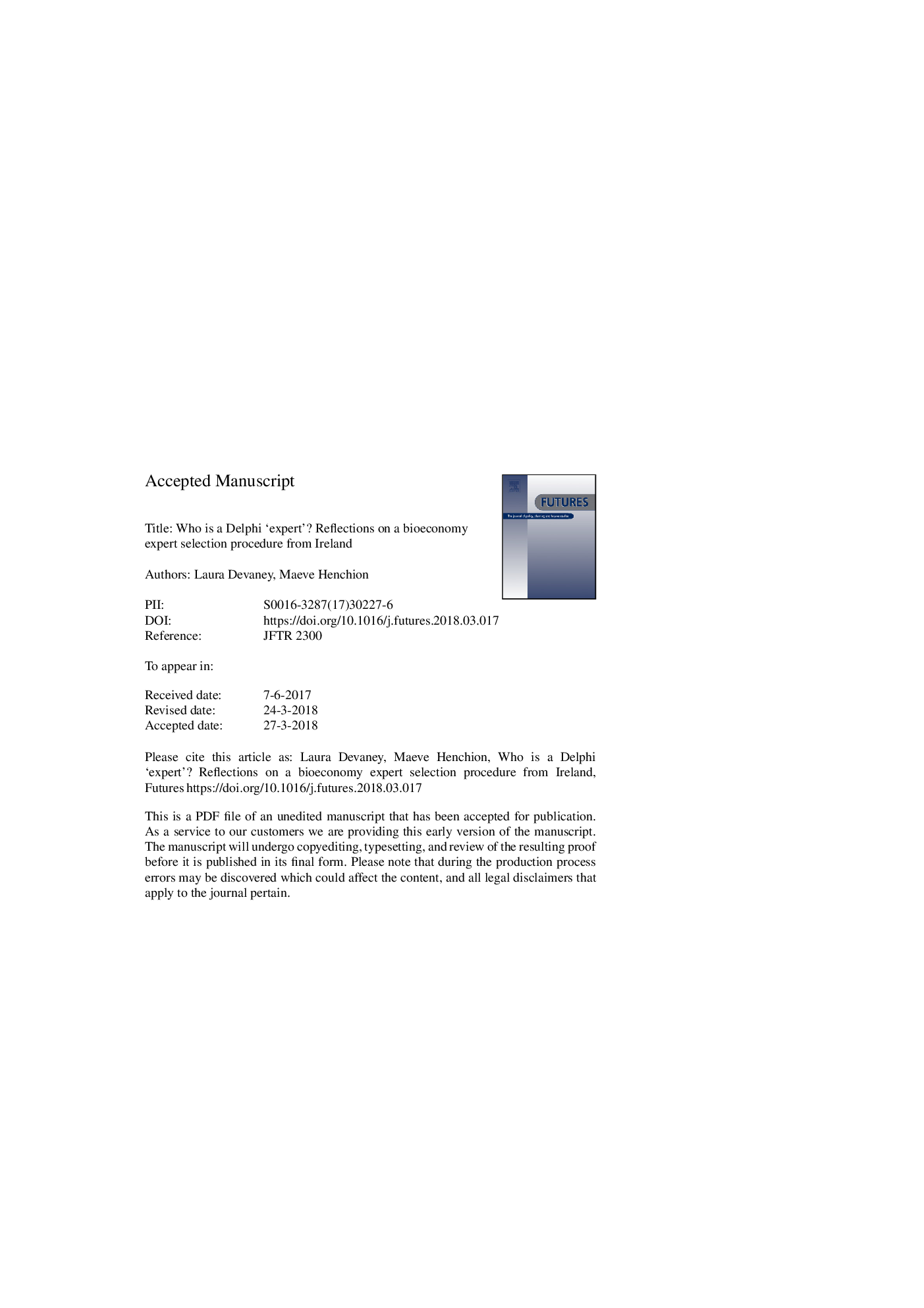| کد مقاله | کد نشریه | سال انتشار | مقاله انگلیسی | نسخه تمام متن |
|---|---|---|---|---|
| 7423736 | 1482733 | 2018 | 21 صفحه PDF | دانلود رایگان |
عنوان انگلیسی مقاله ISI
Who is a Delphi 'expert'? Reflections on a bioeconomy expert selection procedure from Ireland
ترجمه فارسی عنوان
چه کسی متخصص دلفی است؟ بازتاب در یک روش انتخاب کارشناس اقتصاد زیست محیطی از ایرلند
دانلود مقاله + سفارش ترجمه
دانلود مقاله ISI انگلیسی
رایگان برای ایرانیان
کلمات کلیدی
دلفی، اقتصاد بیرونی، انتخاب شرکت کننده، نزدیکی کارشناس، مشارکت ذینفعان، تقصیر
ترجمه چکیده
این مقاله به شکاف در ادبیات مربوط به انتخاب کارشناسان برای شرکت در مطالعات دلفی پاسخ می دهد: یک ابزار پیش بینی متدولوژیک که هدف آن پیش بینی آینده از دوران نظر سنجی با همان گروه کارشناسان است. تعریف کردن متخصص و به این ترتیب، چه کسی باید شرکت کند، برای موفقیت هر تمرین دلفی بسیار مهم است. در حالی که انتخاب شرکت کنندگان برای نمایندگی اهداف را هدف نمی گذارد، عدالت انتخاب، شفافیت و انصاف در کنار سطح دانش و تخصص مناسب نیز اهمیت دارد. این به ویژه در مورد فرصت های آینده احتمالی برای اقتصاد چندجانبه ای است؛ یک مفهوم که با منافع رقابتی خراب شده است. با استفاده از منابع بیولوژیکی مجتمع برای دیدار با نیازهای غذا، خوراک، سوخت و فیبر در آینده، توسعه زیست محیطی متعادل و جامع، نیاز به ورود، سازش و توافق از طیف وسیعی از فعالان عمومی، خصوصی و جامعه مدنی در سراسر کشاورزی، غذا، دریایی، جنگلداری، مواد و انرژی بخش. این مقاله بر روند تعریف و استخدام کارشناسان دلفی در زمینه زیست اقتصاد است. استراتژی های انتخاب مناسب برای سایر مطالعات آینده شامل پیوستن به زنجیره ارزش و رویکردهای وب، تقریب نزدیکی متخصص و معیارهای بازبینی می باشند. این استراتژی های انتخاب نیز گزارشگری در مورد انواع کارشناسان درگیر (و در نتیجه شناسایی منابع بالقوه تعصب) در حالی که حفظ ناشناس بودن را تسهیل می کند. موضوعات مرتبط با اعتماد متخصص، مشارکت عینی و قدرت یادگیری اجتماعی نیز مورد بررسی قرار گرفته است. این مقاله با تشریح مزایای روش دلفی به عنوان ابزار مشارکت فعالان ذینفع برای افزایش بازتاب و تقویت نگرش به سمت آینده ای پایدار به پایان می رسد.
موضوعات مرتبط
علوم انسانی و اجتماعی
مدیریت، کسب و کار و حسابداری
کسب و کار و مدیریت بین المللی
چکیده انگلیسی
This paper responds to a gap in the literature regarding the selection of experts for participation in Delphi studies: a methodological forecasting tool that aims to predict the future utilising rounds of surveys with the same group of experts. Defining who the expert is, and thus who should participate, is crucial to the success of any Delphi exercise. While participant selection does not aim for representativeness, selection equity, transparency and fairness is paramount in addition to levels of appropriate knowledge and expertise. This is particularly the case when considering possible future opportunities for the multi-faceted bioeconomy; a concept that is marred with competing interests. Using renewable biological resources to meet future food, feed, fuel and fibre needs, balanced and inclusive bioeconomy development requires input, compromise and consensus from a diverse range of public, private and civil society actors across agriculture, food, marine, forestry, chemical, material and energy sectors. This paper reflects on the process of defining and recruiting Delphi experts in the bioeconomy context. Appropriate selection strategies, applicable to other futures studies, include adherence to value chain and web approaches, an expert closeness continuum and considered screening criteria. These selection strategies also facilitate reporting on the types of experts involved (and thus identifying potential sources of bias) whilst maintaining anonymity. Themes related to expert confidence, objective participation and the power of social learning are also explored. The paper concludes by outlining the benefit of the Delphi methodology as a tool of active stakeholder engagement for enhancing reflection and fostering open-mindedness towards a more sustainable future.
ناشر
Database: Elsevier - ScienceDirect (ساینس دایرکت)
Journal: Futures - Volume 99, May 2018, Pages 45-55
Journal: Futures - Volume 99, May 2018, Pages 45-55
نویسندگان
Laura Devaney, Maeve Henchion,
